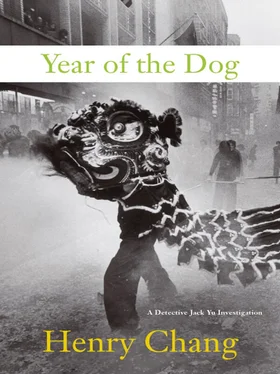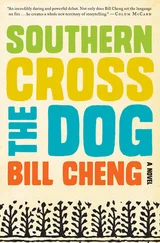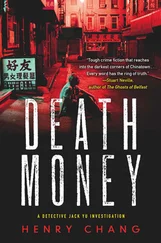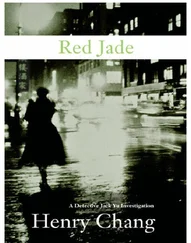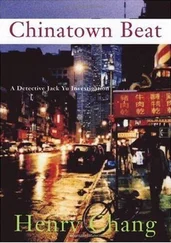Henry Chang - Year of the Dog
Здесь есть возможность читать онлайн «Henry Chang - Year of the Dog» весь текст электронной книги совершенно бесплатно (целиком полную версию без сокращений). В некоторых случаях можно слушать аудио, скачать через торрент в формате fb2 и присутствует краткое содержание. Жанр: Полицейский детектив, на английском языке. Описание произведения, (предисловие) а так же отзывы посетителей доступны на портале библиотеки ЛибКат.
- Название:Year of the Dog
- Автор:
- Жанр:
- Год:неизвестен
- ISBN:нет данных
- Рейтинг книги:3 / 5. Голосов: 1
-
Избранное:Добавить в избранное
- Отзывы:
-
Ваша оценка:
- 60
- 1
- 2
- 3
- 4
- 5
Year of the Dog: краткое содержание, описание и аннотация
Предлагаем к чтению аннотацию, описание, краткое содержание или предисловие (зависит от того, что написал сам автор книги «Year of the Dog»). Если вы не нашли необходимую информацию о книге — напишите в комментариях, мы постараемся отыскать её.
Year of the Dog — читать онлайн бесплатно полную книгу (весь текст) целиком
Ниже представлен текст книги, разбитый по страницам. Система сохранения места последней прочитанной страницы, позволяет с удобством читать онлайн бесплатно книгу «Year of the Dog», без необходимости каждый раз заново искать на чём Вы остановились. Поставьте закладку, и сможете в любой момент перейти на страницу, на которой закончили чтение.
Интервал:
Закладка:
“I’m not saying that, but if your own folks really are robbing you, you sure don’t wanna hear it from some white cop who’s laughing inside.”
Jack shook his head at the raw truth in Billy’s words.
“Don’t worry about it, Jake. It’s Chinatown.”
“I’m out, Billy,” Jack insisted.
“That’s what I told Jeff,” Billy half-protested. “Here, take his card anyway. Call him if you get any bright ideas.”
Pocketing the card, Jack noticed the United National , a Chinese-language newspaper, on the counter. Plastered across the front page were photos of the Kung family murder-suicide. The headline TRAGEDY, reminded him to visit Ah Por, hoping for clarity. “You done with this?” he asked, folding up the newspaper.
“Take it,” Billy answered.
“You heard about the shooting on Division? Players with AK-47s?”
“Yeah, it was on the radio,” Billy remembered.
“What’s up with that?”
“Don’t know. I can check with the Fuk boys later. They’re working the slop room in the afternoon.”
“I’ll call you tonight.”
“It’s Friday,” Billy grinned. “You know where I’ll be.”
Jack smiled. Friday night was always right for Grampa’s, a revered local bar dive.
The sky outside the Tofu King looked ominous again.
Billy put Jack’s containers into a plastic bag, threw up his hands, palms out, and shook his head to refuse Jack’s money.
Jack smiled and thumped his right fist over his heart to say thanks, and backed out through the cold, steamy door.
He took the shortcut down Park Street onto Mulberry, going along Columbus Park.
He didn’t expect them to be there, the old ladies, but he wanted to be sure, and it was along the way. He was right. Not a soul here, the wind too cold, and the leaves long gone from the trees. In the warmer seasons, the old women lined the fence around the park, squatting low on plastic stools, with their charts, and herbs, and the red books containing their divinations. It was much too cold now, and Jack knew Ah Por would be indoors. He remembered her because Pa had gone to her those years after Ma died. Mostly it was for lucky words or numbers, or any kind of good news.
More recently, Ah Por’s readings, in an oblique manner, had provided accurate clues for Jack. The Senior Citizens Center, he thought, stepping away from the park.
The dull red brick building hunkered down on the corner of Bayard under the flat sky, a stunted cousin to the art-deco colossus a block away at Baxter: the Tombs Criminal Facility, also known as the Men’s House of Detention, and Criminal Courts Building. Its imposing facade was seventeen stories of cut limestone blocks, with solid granite at street level, circa 1938.
The red brick building was older, maybe a hundred years old. Its exterior was a blend of medieval-styled stonework, columns, and turrets. All the window frames were painted green. Jack remembered the place as his neighborhood grammar school, Public School 23, five stories of classrooms, auditorium, and cafeteria. Green linoleum throughout.
The school had served many generations of immigrants, including the Irish and the Italians. Ten years after Jack’s all-Chinese class had graduated, the community outgrew the school, redirecting its sturdy rooms to servicing the senior citizens and the various cultural and civic organizations. They served free breakfast to seniors now, at the same lunch tables and benches that Jack remembered eating at as a schoolboy. Jack recalled those free lunches: cheese sandwiches, split-pea soup, macaroni-and-cheese, peanut-butter-and-jelly sandwiches. On rare occasions the kids would get a Dixie cup of ice cream.
When he stepped inside, it was as if the past had caught up with him, then surpassed him. The worn linoleum of his schooldays had been replaced by lighter vinyl tiles. Across the ceiling, hung new lighting, soft, but sufficiently bright for the elderly. The drone of people eating and talking filled the open space. Chung Wah , Chinese radio, played news and weather over the PA system, just under the chatter and gossip.
Jack went toward the back of the room, where he saw that the old kitchen of the public school cafeteria had been refitted with a half-dozen gas-burning wok stations. Against the wall was a long shelf with five large commercial-grade electric rice cookers.
On a bulletin board, in Chinese characters, they’d posted the different menus for every day of the month. Soups: winter melon, lotus root, fish, or vegetables. Main plates: chicken wings, pork, salmon, or beef, pork chops, and Chinese sausage. Fruit of the day was usually oranges.
Jack looked out over the lunch tables, scanning the room for Ah Por, one old woman in a field of bundled gray heads, most of them wearing overstocked off-color down jackets, donated by Good Panda, the company logo prominently screened across their backs. He continued scanning, his eyes sweeping over more than a hundred Chinese seniors slurping their steaming breakfasts of boiled rice congee, jook, dipping the little bits of bread they’d brought along. A free bowl this morning, funded by some charitable organization, city agency, federal food program, or tong. Whatever. Jack was happy to see the elderly eating heartily, jook, the staple of their lives. Jack knew that Pa had come here for a few jooks in his day, if not for the sustenance, surely for the camaraderie.
Abruptly, he spotted her at the end of the bench by the far wall. The oversized down jacket made her appear smaller, huddled over her plastic bowl. When Jack came to her side the other seniors regarded him with curiosity and suspicion, but Ah Por didn’t seem to notice him. Probably her eyes are failing, he thought, although he knew that the secrets she saw had nothing to do with her eyesight.
“Ah Por,” Jack said, just loud enough above the din.
She looked up and after a moment, he saw small darts of recognition in her eyes. A thin, weary smile crossed her lips. He could see that she had none of her instruments of divination, no red booklet or cup of bamboo sticks, but he remembered she sometimes applied face reading to everyday items, and with a clairvoyant’s touch, could provide a clue that, however obscure, proved to be on target.
This time, he needed consolation, clarity, more than a clue. Her words might exorcise the bad kharma clinging to him now.
“Ah Por,” Jack repeated, handing her the United National, splayed open at the dead Kung family’s photos. He pressed a folded five-dollar bill, folded square, into her ancient palm, gave her a smile, and a small bow of his head.
She ran a gnarled finger over the newsprint photos, closed her eyes. Slowly dropping her head to one side, as if straining to hear something, she said, “Fire.” She paused, then softly, “It is a sign of sacrifice.”
Her fingernails played over the text of the newspaper.
“Wind,” she said, “blows away fear.” Jack leaned in at the softness of her words.
“A cleansing is needed. Wash out the regrets. Sometimes it is necessary, to start anew.” Her palm passed over the school-posed pictures of the children.
“There is no fault in this.” Ah Por caught her breath, looked at Jack the way a grandmother looks at a schoolboy. “To be firm in punishment brings good in the end.” She put out her hand and whispered, “Go to the temple, say a prayer, and make a donation. Eight dollars.”
Jack palmed her another five-dollar bill, along with Jeff Lee’s business card.
She rubbed up the card between her fingers, a look of annoyance crossing her face before she closed her eyes.
She said “Malo.” Jack bent closer. “Bad,” she said. Bad, in Spanish? He was confused momentarily, until she opened her eyes, said it again. “Ma lo,” softening the Toishanese accent, meaning monkey.
Читать дальшеИнтервал:
Закладка:
Похожие книги на «Year of the Dog»
Представляем Вашему вниманию похожие книги на «Year of the Dog» списком для выбора. Мы отобрали схожую по названию и смыслу литературу в надежде предоставить читателям больше вариантов отыскать новые, интересные, ещё непрочитанные произведения.
Обсуждение, отзывы о книге «Year of the Dog» и просто собственные мнения читателей. Оставьте ваши комментарии, напишите, что Вы думаете о произведении, его смысле или главных героях. Укажите что конкретно понравилось, а что нет, и почему Вы так считаете.
